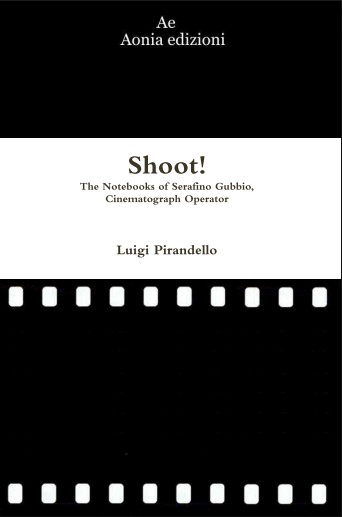Luigi Pirandello (28 June 1867 – 10 December 1936) was an Italian dramatist, novelist, and short story writer awarded the Nobel Prize in Literature in 1934, for his "bold and brilliant renovation of the drama and the stage." Pirandello's works include novels, hundreds of short stories, and about 40 plays, some of which are written in Sicilian. Pirandello's tragic farces are often seen as forerunners for Theatre of the Absurd.
Pirandello's art arises out of a climate of profound historical and cultural disappointment. The wound caused by the betrayal of Il Risorgimento was never definitively healed in the soul of the writer. He added to a sense of diffuse disillusionment in Italy at the end of the 19th century, a southern disdain for the politics of the newly united Italy with regard to the problems of the south. Pirandello adapted the title of a discourse by F. Brunetière La Banqueroute de science to describe this attitude which he felt toward the Risorgimento: la bancarotta del patriottismo (The Bankruptcy of Patriotism). This is the phrase he used in his novel I Vecchi e i Giovani (The Old and the Young) (1909–1913), a "populous and extremely bitter" novel which seems to signal a brusque halt in the author's search into the individual conscience which he had begun in Il Fu Mattia Pascal (The Late Mattia Pascal).
In I Vecchi e I Giovani, Pirandello traces a vast historical fresco, which fits into an entire southern Italian tradition of writing, beginning with the Vicerè of De Roberto. The novel, set in Sicily during the period of the Fasci Siciliani, delineates the "failure... of three myths" (of the Risorgimento, of unity, of socialism), replacing them with a "hopeless emptiness... with no possibility of redemption." But despite the well documented and obvious connections to a precise panorama of crisis, there is a clear impression that Pirandello's discordance with reality was pre-existing. The profound discontent and malaise, the reasons for unhappiness lay within him, as is always the case "in every person of an introspective nature, that is in every person of a poetic nature", according to Eugenio Montale, who was referring to himself. On the other hand, it is probably precisely the disagreement with reality that constitutes the true wealth of the artist who, because of his inability to adapt, must abandon the beaten paths in order to travel new and different or forgotten roads.
Animated by a furious need to clear away all false certitudes, Pirandello pitilessly dismantles every fictitious point of reference. This initial, resolute epoché opens up horizons of disconcerting restlessness; reality is seen as having no order and as being contradictory and unattainable. It evades any attempt at classification and systematically violates the obligatory nexus of cause and effect which, even while seeming to suffocate in an unbreakable concatenation the tiniest spark of freedom, permits us to know, to predict and therefore to dominate.
Pirandello's art arises out of a climate of profound historical and cultural disappointment. The wound caused by the betrayal of Il Risorgimento was never definitively healed in the soul of the writer. He added to a sense of diffuse disillusionment in Italy at the end of the 19th century, a southern disdain for the politics of the newly united Italy with regard to the problems of the south. Pirandello adapted the title of a discourse by F. Brunetière La Banqueroute de science to describe this attitude which he felt toward the Risorgimento: la bancarotta del patriottismo (The Bankruptcy of Patriotism). This is the phrase he used in his novel I Vecchi e i Giovani (The Old and the Young) (1909–1913), a "populous and extremely bitter" novel which seems to signal a brusque halt in the author's search into the individual conscience which he had begun in Il Fu Mattia Pascal (The Late Mattia Pascal).
In I Vecchi e I Giovani, Pirandello traces a vast historical fresco, which fits into an entire southern Italian tradition of writing, beginning with the Vicerè of De Roberto. The novel, set in Sicily during the period of the Fasci Siciliani, delineates the "failure... of three myths" (of the Risorgimento, of unity, of socialism), replacing them with a "hopeless emptiness... with no possibility of redemption." But despite the well documented and obvious connections to a precise panorama of crisis, there is a clear impression that Pirandello's discordance with reality was pre-existing. The profound discontent and malaise, the reasons for unhappiness lay within him, as is always the case "in every person of an introspective nature, that is in every person of a poetic nature", according to Eugenio Montale, who was referring to himself. On the other hand, it is probably precisely the disagreement with reality that constitutes the true wealth of the artist who, because of his inability to adapt, must abandon the beaten paths in order to travel new and different or forgotten roads.
Animated by a furious need to clear away all false certitudes, Pirandello pitilessly dismantles every fictitious point of reference. This initial, resolute epoché opens up horizons of disconcerting restlessness; reality is seen as having no order and as being contradictory and unattainable. It evades any attempt at classification and systematically violates the obligatory nexus of cause and effect which, even while seeming to suffocate in an unbreakable concatenation the tiniest spark of freedom, permits us to know, to predict and therefore to dominate.
| Libro Italia € 8,99 (lo compro qui) E-book Italia € 0,89 (lo compro qui) Amazon Italia € 8,99 (lo compro qui) | Libro USA $ 9,99 (lo compro qui) E-book USA $ 0,99 (lo compro qui) Libro Germania € 9,99 (lo compro qui) |
| E-book Germania € 0,89 (lo compro qui) Libro Regno Unito £ 6,99 (lo compro qui) E-book Regno Unito £ 0,77 (lo compro qui) | Libro Francia € 8,99 (lo compro qui) E-book Francia € 0,89 (lo compro qui) Libro Spagna € 8,99 (lo compro qui) |
I study people in their most ordinary occupations, to see if I can succeed in discovering in others what I feel that I myself lack in everything that I do: the certainty that they understand what they are doing.
At first sight it does indeed seem as though many of them had this certainty, from the way in which they look at and greet one another, hurrying to and fro in pursuit of their business or their pleasure. But afterwards, if I stop and gaze for a moment in their eyes with my own intent and silent eyes, at once they begin to take offence. Some of them, in fact, are so disturbed and perplexed that I have only to keep on gazing at them for a little longer, for them to insult or assault me.
No, go your ways in peace. This is enough for me: to know, gentlemen, that there is nothing clear or certain to you either, not even the little that is determined for you from time to time by the absolutely familiar conditions in which you are living. There is a something more in everything. You do not wish or do not know how to see it. But the moment this something more gleams in the eyes of an idle person like myself, who has set himself to observe you, why, you become puzzled, disturbed or irritated.
I too am acquainted with the external, that is to say the mechanical framework of the life which keeps us clamorously and dizzily occupied and gives us no rest. To-day, such-and-such; this and that to be done hurrying to one place, watch in hand, so as to be in time at another. "No, my dear fellow, thank you: I can't!" "No, really? Lucky fellow! I must be off...." At eleven, luncheon. The paper, the house, the office, school. ... "A fine day, worse luck! But business...." "What's this? Ah, a funeral." We lift our hats as we pass to the man who has made his escape. The shop, the works, the law courts....




